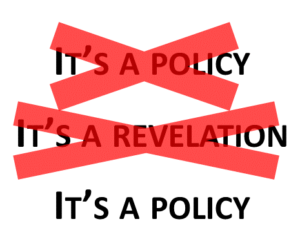It was the spring of 2019, and it had been over a year since I’d been baptized into the Episcopal church. I still felt like it was the best decision I’d ever made, but that didn’t mean that I wasn’t still haunted sometimes. I was sitting in a Taize service one Sunday evening and thinking about my decision to leave the LDS faith, and I started to feel sick. Some fears are old ones; some fears are laid down in your understanding of the world before you’ve even begun to develop a sense of self. I’d been told all my life that walking away from God’s One True Church was a terrible mistake with eternal consequences, and even though my conversion had been an amazing experience, that didn’t always cancel out the anxiety, or erase the years of General Conference talks given in ominous tones by human leaders who were one hundred percent positive that they spoke for God. I wanted conversion to be more straightforward, cleaner; I wanted it to be a light that was so blinding that I could no longer even see the past, and I had no choice but to go forward. But while it was undeniably life-changing, my past was still there, a part of me to be reckoned with. Read More
Showing all posts in Nov 5 Policy
Some Thoughts on the End of the Exclusion Policy
The Church announced today that the exclusion policy of November 2015, which branded people in gay marriages as apostates and denied blessing and baptism to their children, is ending. I have a bunch of thoughts on this that I’d like to share (most of which I’ve probably borrowed in one form or another from discussions with friends on Facebook).
- First, I’m thrilled! The exclusion policy was terrible from the beginning. It was bad in its direct effect of exclusion, but perhaps even worse in the signal it sent to LGBT people that they are seen as uniquely wicked by the Church, requiring a special bit in the Handbook to outline just how awful they are. I am therefore very happy to see the Q15 decide to drop it.
- I am honestly shocked–in a good way–that President Nelson allowed this change to happen during his presidency. He’s widely seen as its architect, even though it was put in place during President Monson’s tenure. I am impressed that President Nelson is willing to let go of something he once defended as being revelation, rather than leaving it for the next Church president to undo.
- All the above notwithstanding, I think it’s awful that Church leaders still absolutely refuse to say–or even imply–either that they were wrong or that they are sorry. It’s great that the policy is being taken back, but with no admission of wrong or apology, where does that leave all the people
 who were hurt during the three and a half years it was in place? Do Church leaders seriously expect us to believe that it was just the will of God that they suffer, but that now God has changed his mind? This change feels similar to the changes made in the endowment ceremony just a couple of months ago. It was great that the hierarchy-imposing structure was reduced, but it was awful that there was not even a mention of the pain that had been caused to so many women by the the “hearken” and “obey” covenants and the resulting power differential they were put under.
who were hurt during the three and a half years it was in place? Do Church leaders seriously expect us to believe that it was just the will of God that they suffer, but that now God has changed his mind? This change feels similar to the changes made in the endowment ceremony just a couple of months ago. It was great that the hierarchy-imposing structure was reduced, but it was awful that there was not even a mention of the pain that had been caused to so many women by the the “hearken” and “obey” covenants and the resulting power differential they were put under.
How to Get Those Darn Gay People to Stop Being So Obsessed With Their Gay Identities
One of the complaints I’ve heard numerous times from Latter-day Saints is that we gay people are way too obsessed with our gayness, that we get caught up in some outlandish homosexual identity (which might eventually lead to the dreaded “gay lifestyle”), and that we need to just stop thinking about sexual orientation as being that big of a part of who we are. We’re discouraged from even using the word “gay,” because it might swallow up our identities and make us think that there’s nothing else to us. Mormons who claim to be especially enlightened have informed me that they just don’t think about people in those terms, that they’ve transcended even being aware of such details about a person, and then complained about gay people who “force” their orientation on others by talking excessively about it, and thereby making everyone feel unnecessarily awkward and uncomfortable. Others have objected to an idea put forth by some church members that gay Mormons have a particularly challenging trial, pointing out that everyone has difficulties in life, and asking, when did we decide that gay people should get all this special attention? Read More